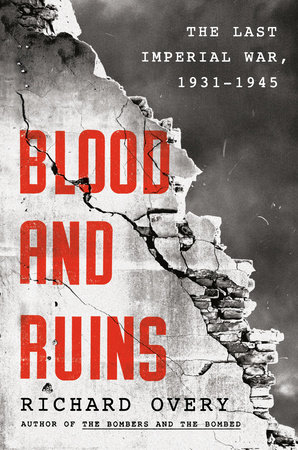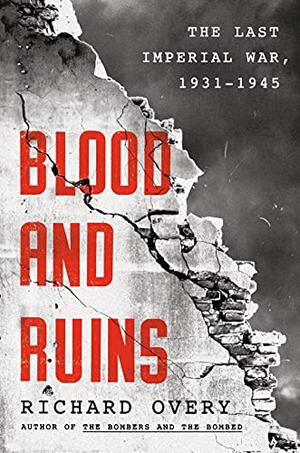|
|
Post by Admin on May 11, 2022 17:21:22 GMT
 Blood and Ruins THE LAST IMPERIAL WAR, 1931-1945 By Richard Overy BLOOD AND RUINS A brilliant, mildly controversial interpretation of the history, conduct, and aftermath of WWII. BLOOD AND RUINS THE LAST IMPERIAL WAR, 1931-1945 BY RICHARD OVERY RELEASE DATE: APRIL 5, 2022 More than 1,000 pages on World War II might seem overkill, but not for one of the world’s leading military historians. Overy disagrees with “the conventional view of the war,” which portrays “Hitler, Mussolini and the Japanese military as causes of crisis rather than its effects, which is what they were.” He emphasizes that historians describe World War I as the outcome of a 19th-century global imperial order dominated by the British and French and opposed by Germany, which considered itself a “have-not” nation whose survival depended on “conquering additional imperial zones of its own.” Few readers will quarrel with that assessment, but they may be surprised with the author’s startling yet persuasive argument that the same description applies to WWII. The 1920s featured three unhappy nations—Germany, Japan, and Italy—who felt that their national identities were in danger unless they could expand their influences. First off the mark was Japan, which invaded China in 1931. Meanwhile, viewing the eastern Mediterranean and North Africa as steppingstones to a new Roman Empire, Mussolini invaded Ethiopia. Overy emphasizes that Hitler had no intention of conquering the world. His view was that Germany, “as a vigorous, progressive and cultured people, lacked sufficient territory to…nourish a growing population.” Annexing Austria, the Sudetenland, and Czechoslovakia were acts of an energetic imperial nation, and it was no secret that Poland was next. Still, Hitler expressed surprise when Britain and France declared war. A master of technical detail, Overy summarizes the campaigns but concentrates on the backgrounds and decisions of the leaders who, despite rhetoric about freedom, found themselves in a high-tech imperialistic war. Victory occurs halfway through, and the author devotes the remaining chapters to other relevant imperial issues: Britain’s, France’s, and Holland’s violent efforts to preserve their empires did not peter out until the 1960s; China suffered civil war; and Stalin brutally took control of Eastern Europe.  A brilliant, mildly controversial interpretation of the history, conduct, and aftermath of WWII. ABOUT BLOOD AND RUINS “Monumental… vast and detailed study that is surely the finest single-volume history of World War II. Richard Overy has given us a powerful reminder of the horror of war and the threat posed by dictators with dreams of empire.” – The Wall Street Journal A thought-provoking and original reassessment of World War II, from Britain’s leading military historian A New York Times bestseller Richard Overy sets out in Blood and Ruins to recast the way in which we view the Second World War and its origins and aftermath. As one of Britain’s most decorated and respected World War II historians, he argues that this was the “last imperial war,” with almost a century-long lead-up of global imperial expansion, which reached its peak in the territorial ambitions of Italy, Germany and Japan in the 1930s and early 1940s, before descending into the largest and costliest war in human history and the end, after 1945, of all territorial empires. Overy also argues for a more global perspective on the war, one that looks broader than the typical focus on military conflict between the Allied and Axis states. Above all, Overy explains the bitter cost for those involved in fighting, and the exceptional level of crime and atrocity that marked the war and its protracted aftermath—which extended far beyond 1945. Blood and Ruins is a masterpiece, a new and definitive look at the ultimate struggle over the future of the global order, which will compel us to view the war in novel and unfamiliar ways. Thought-provoking, original and challenging, Blood and Ruins sets out to understand the war anew. |
|
|
|
Post by Admin on May 11, 2022 18:07:44 GMT
HUMANITY’S eternal propensity to wage war – and why – has been acutely and unrelentingly examined, impeccably researched and re-told in this breath-taking masterpiece compiled by an award-winning academic. And while Professor Overy has produced a work of genius, he has avoided using great swathes of overanalysed reasoning by writing beautifully explained sections in a readable and digestible format filled with the ‘did you know?’ kind of facts that jumped out as I picked up this 1,000-page tome. A big read, yes, but the information is retained by the reader and it is as lively and engaging as any brilliant cinematic documentary. Overy aims to change the perspective through which World War Two is viewed, including its origins. Foremost, he argues it was the 'great imperial war', the dramatic and bloody end of a century of global expansion and of the interwar ambitions of Italy, Germany and Japan, each determined to forge their own new empires. For example, early in the book, we are enlightened about how the start of the Great War in 1914 did not mark the end of global peace. It was, according to the author, a time in 1894 when the Japanese military forces began to encroach upon the Chinese tributary state of Korea in a bid to destabilise power. This all-out aggression indicated how the Japanese Empire had become a major player in the colonial game, and was followed by combat against Russian forces in a bid to claim Manchuria. Then came war between Spain and America between 1898–99, which saw the United States win countries away from Spanish rule including the Philippines, Guam, and Puerto Rico. The idea of a ‘Greater America’ had begun in earnest. The Second Boer War between Great Britain and the two Afrikaner republics hinged on the former’s plans to extend empire. This long, complicated conflict led to the deaths of tens of thousands on both sides, but most controversially, of those who suffered severe neglect in concentration camps. Such background is important, argues the author, a winner of the Wolfson Prize for History, if we are to understand the impact of colonisation and Imperialism. By 1918, territorial wars resulted in the collapse of multiple empires – the German, Austro-Hungarian, Ottoman, and Russian. ‘What was learned?’, Overy asks in the prologue, quoting the political economist Leonard Woolf who wrote in 1928: “Imperialism, as it was known in the 19th century, is no longer possible and the only question is whether it will be buried peacefully or in blood and ruins.” Discover how the fashion for Charles Darwin’s scientific theories of supreme evolution were absorbed and spoken about by doctors since 1904, as they pondered various racial differences and a ‘final solution’ to them – all long\ before the creation of the Nazi Party. It was German geographer Friedrich Ratzel who coined the term ‘lebensraum’ (living space) when he argued that modern superior cultures needed to expand territorially to provide food and material resources for a growing population. Ratzel’s theory ‘Political Geography’ was read by Hitler and Rudolf Hess, who eagerly discussed this through the 1920s. Cultural superiority informed European Imperialism and drew from the scientific theory that suggested a hierarchy of races, one that relied on genetic difference. Hence the ‘Race and Space’ policy that fuelled the engine of Nazi politics. The philosophical polemics of the German intellectual Friedrich Nietzsche and his big concepts examining a range of ideas, including that of an Übermensch (super-race) were unfairly ambushed by the Nazis in their bid for power and master-slave morality. Overy includes a prophetic quote from Nietzsche written in 1884 on the title page: “We have entered the classical age of war on the largest scale, the age of scientific war with popular support – there will be wars such have never yet been on earth.” Eleven compelling sections chart how war was justified, fought, supplied and paid for on a huge scale, and how it was supported by mass mobilisation. This thoughtprovoking book is illuminating and contains a raft of supporting illustrations, maps and tables. . Reviewed by Melody Foreman Publisher: Allen Lane/Penguin Books Ltd Web: www.penguinrandomhouse.co.ukISBN: 978-0-71399-562-6 Hardback & eBook:: 1,040 pages RRP: £40 (hardback) |
|
|
|
Post by Admin on May 11, 2022 19:34:34 GMT
'I fought against Nazis with the Soviets, now I flee Putin's war' - BBC News 35,883 views May 11, 2022 A man who once fought alongside the Soviet Army against the Nazis has said he has now fled his home in Ukraine to escape Russian troops. When Arkady Perchenko was 11 years old he fought alongside the Soviets, as part of the local resistance against the Nazis in World War Two. But now at the age of 92, he was forced to leave his home in Ukraine to escape from Russian forces. From safety in Israel, Arkady has been talking to the BBC about his view of both wars.  |
|
|
|
Post by Admin on May 11, 2022 20:29:45 GMT
|
|
|
|
Post by Admin on May 11, 2022 20:35:09 GMT
|
|







